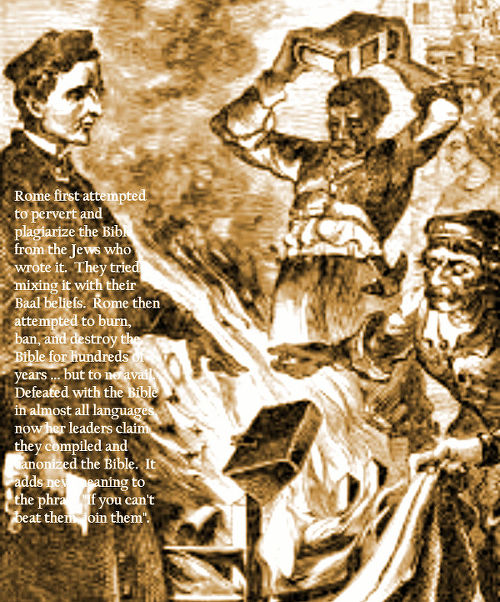Rome And The Bible
by Erick Rothbeck

Out of the estimated 800 million Roman Catholics in the world today, it should be stated that over 90% do not realize what the official stand of the Roman Catholic Church is towards the Bible. Rome will tell the world she treasures the Bible and accepts it as God’s Holy Word, but history and facts speak quite the contrary.
In 1179 pope Alexander III forbade the Waldensians to preach, which preaching they were doing with a common-language translation of parts of the Bible.
In 1184, at the Synod of Verona, Italy, pope Lucius III decreed the ex-communication of all Bible-believing “heretics.”
In 1199, pope Innocent III condemned the translation into French of the Psalms, the Gospels and Paul’s letters. Any copies found were burned by Cistercian monks.
In 1211, by order of pope Innocent III, Bishop Bertram of Metz organized a crusade against all people reading the Bible in the vernacular, and all such Bibles found were duly burned.
In 1215 the first three canons of the Fourth Lateran Council were directed against heretics who dared to preach. The Dictionnaire de Theologie Catholique recognizes that this measure was aimed mainly at the Waldenses, who were preaching with common-language Bibles.
In 1229, Canon 14 of the Council of Toulouse states, “We forbid the laity to have in their possession any copy of the books of the Old and New Testament, except the Psalter, and such portions of them as are contained in the Breviary; and we most strictly forbid even these works in the vernacular.
In 1559 pope, Paul IV said that no Bible in the vernacular may be printed nor kept without permission of the Holy Office.
In 1564, pope Pius IV stated, “Experience has shown that if reading of the Bible in the vulgar tongue is permitted indiscrimately, due to the rashness of men, more harm than good arises.”
In 1590 pope Sixtus V stipulated that no one could read the Bible in a common language without special permission from the Apostolic See.
In 1836, pope Gregory XVI issued a warning to all Catholics that the fourth rule of their Index published in 1564 by Pius IV was still valid.
In 1897, in his Apostolic Constitution Officiorum, pope Leo XIII said, “All native language versions, even those published by Catholics, are absolutely prohibited unless they have been approved by the Apostolic See or edited under the supervision of bishops, with explanatory notes taken from the Church Fathers and learned Catholic writers.”
Today Catholics enjoy more freedom in reading the Bible, but lest they forget, it can still only be interpreted and understood in the light of official church teachings and forms only a part of a divine revelation, the other being held in unwritten oral church Tradition.
“Every word of God is pure: he is a shield to them that put their trust in him. Add thou not to his words, lest he reprove thee, and thou be found a liar.” Proverbs 30:5-6
Additional Information Related To The Catholic Church And Their Unbiblical Religious Inventions:
- Mission to Catholics
- Scriptural Truths for Roman Catholics
- Compassionately Presenting Biblical Salvation (to Catholics) – a series of messages by several former Catholics including former Catholic clergy